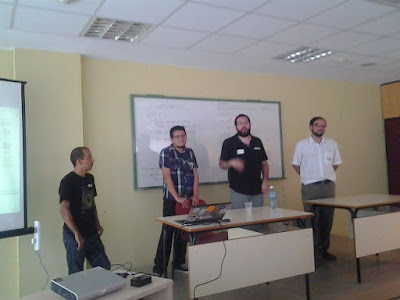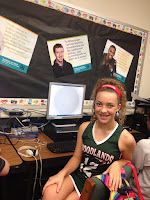Once again, the PSF is proud to underwrite and produce the largest gathering of the international Python community at PyCon 2016!
The 2016 conference will be held in Portland, Oregon, and will take place from May 28th to June 5th -- a little later in the spring than previous PyCons.
Those of you who have attended previous PyCons know what a fantastic event these are. Education, advocacy, community building. . . all take place at a PyCon. If you've never been, you can check out these talks from last year's
PyCon 2015 in Montreal.
But nothing can fully give the full experience, the excitement and flavor, the connections forged and strengthened, the sheer intensity of spending several days with a large community of bright, energetic, and engaged Pythonistas, sharing their knowledge and skills and teaching and learning with each other, as attending a PyCon itself.
The conference schedule will begin on the weekend with tutorials, then there will be five full tracks of talks, over 100 total, during the three main conference days. As usual, development sprints will follow, offering a unique opportunity for developers to work in "dream teams" on open source projects. And of course there will be the Summits, Expo Hall, Poster Session, Sponsor Workshops, Lightning Talks, Open Spaces, Job Fair, PyLadies Auction, and last, but hardly least, the dynamic and inviting "Hallway Track," that make for such a vibrant conference. All of this, along with ample (organized, spontaneous, and even some chaotic) social and cultural activities (including the annual Opening Reception and 5K Charity Run). The venue will be the centrally-located Convention Center which will allow for easy exploration of the fabulous city of Portland, Oregon.
 |
By Another Believer (Own work) [CC BY-SA 3.0 (http://creativecommons.org/licenses/by-sa/3.0)], via Wikimedia Commons
|
As this year's PyCon organizer, Brandon Rhodes, tells us on the PyCon blog,
PyCon offers tremendous value for both individuals and businesses. PyCon’s three main conference days offer keynote speeches, nearly a hundred talks, Open Space rooms for meetings and workshops, and an Expo Hall where you can meet dozens of sponsor companies and open source non-profits. More than 3,000 fans and contributors to Python are expected to attend the conference!
Another feature of PyCons as opposed to other tech conferences that must be mentioned is the diversity of speakers and attendees. For both 2014 and 2015 in Montreal, a full 33% of talks were given by women. Not only does this make for a more varied range of content and a higher degree of excellence (since the work of women programmers contributes to a greater pool of proposals from which the final talks are selected), but for a truly welcoming community. As someone who has attended the last four PyCons (the first of which, before I even became a Python user), I can tell you with absolute certainty that if you come, you will not be disappointed!
And, please, if you're working on something interesting, or care to share some insights, experiences, project development, or theoretical observations, consider proposing a talk, tutorial, or a poster session.
Registration is now open, and, if you hurry, you can qualify for the reduced cost of an Early Bird ticket. If the past is any indication, these tickets, and all remaining ones, will sell-out quickly. Don't be left out! Register today!
I would love to hear from readers. Please send feedback, comments, or blog ideas to me at msushi@gnosis.cx.











